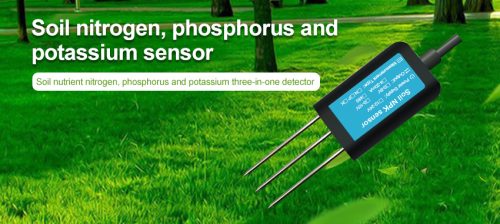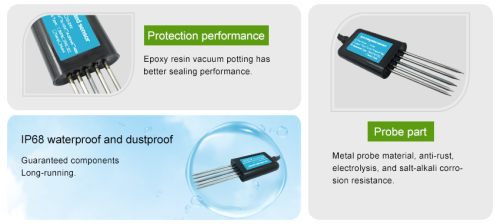To accurately assess and manage soil nutrient content, investing in a soil NPK sensor can provide invaluable insights. Due to maintaining optimal nutrient levels in soil is essential for agriculture and gardening. In this article, we will delve into the importance of soil NPK sensors, their benefits, how they work, and why they are an invaluable tool for farmers and gardeners alike.
The Importance of Soil NPK Sensors

Soil NPK sensors play a vital role in understanding the nutrient composition of soil, specifically nitrogen (N), phosphorus (P), and potassium (K). These macronutrients are crucial for plant growth, development, and overall productivity. By utilizing a soil NPK sensor, growers can make informed decisions regarding fertilization, minimize nutrient deficiencies or excesses, and optimize crop yields while reducing environmental impacts.
Benefits of Soil NPK Sensors
Investing in a soil NPK sensor offers several advantages to farmers and gardeners:
Accurate Nutrient Monitoring:

Soil NPK sensors provide real-time measurements of nutrient levels in the soil. This data allows growers to precisely gauge the availability of essential nutrients and tailor fertilization strategies accordingly, promoting optimal plant nutrition.
Precision Fertilizer Application:
With accurate nutrient readings from the sensor, farmers and gardeners can apply fertilizers with precision, avoiding unnecessary overuse or wastage. This targeted approach minimizes environmental pollution and reduces fertilizer costs.
Early Nutrient Deficiency Detection:
Soil NPK sensors can detect nutrient deficiencies before visible symptoms appear in plants. Early identification facilitates prompt corrective actions, preventing yield losses and ensuring healthier crops.
Customized Nutrient Management:
Different crops have varying nutrient requirements. Soil NPK sensors enable growers to customize nutrient management plans based on specific crop needs, enhancing productivity and quality.
How Soil NPK Sensors Work
Soil NPK sensors employ various technologies to measure soil nutrient content. One common method is spectroscopy, where the sensor emits light into the soil and analyzes the reflected wavelengths to determine nutrient levels. Another approach is electrochemical sensing, in which the sensor measures electrical conductivity changes caused by nutrient ions in the soil solution. Some sensors also utilize ion-selective electrodes to detect specific nutrient ions.
To obtain accurate readings, soil NPK sensors require calibration based on lab analysis of soil samples. This calibration ensures that the sensor provides precise nutrient measurements tailored to the specific soil type and conditions.
Integration with Precision Agriculture
Soil NPK sensors contribute to the broader concept of precision agriculture, where technology aids in optimizing farming practices. By combining soil NPK sensor data with other technologies such as GPS, remote sensing, and crop modeling, farmers can create sophisticated management strategies that maximize productivity while minimizing resource inputs.
Challenges and Considerations
Although soil NPK sensors offer numerous benefits, there are a few considerations to keep in mind:
Sensor Selection:
Different soil NPK sensors may utilize different technologies and have varying measurement capabilities. It is essential to choose a sensor that aligns with your specific needs and the crops you are growing.
Soil Heterogeneity:
Soil nutrient distribution can vary within a field or garden. Regular sampling using multiple sensors throughout the area of interest can help account for such heterogeneity and provide a more comprehensive assessment.
Calibration and Maintenance:
Soil NPK sensors require periodic calibration to ensure accurate readings. Additionally, regular cleaning and maintenance are necessary to prevent sensor contamination or deterioration.
Conclusion
Soil NPK sensors are invaluable tools for farmers and gardeners seeking accurate and efficient nutrient management. By providing real-time insights into soil nutrient levels, these sensors enable precise fertilization, early detection of nutrient deficiencies, and customized nutrient management. When integrated with precision agriculture techniques, soil NPK sensors contribute to sustainable farming practices that optimize productivity while minimizing environmental impacts. Embracing soil NPK sensors empowers growers to unlock the true potential of their crops and ensure long-term agricultural success.
